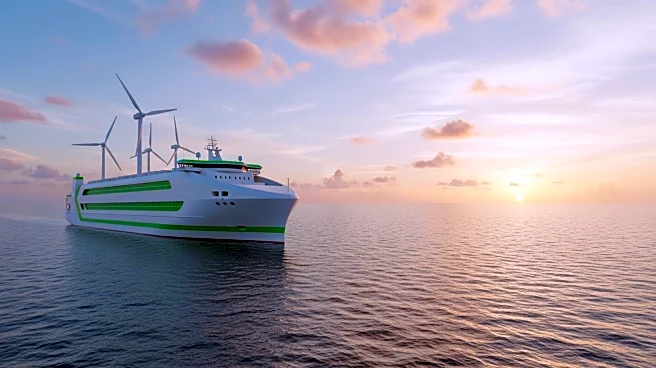What's Happening?
The Neoliner Origin, recognized as the world's largest cargo sailing ship, has completed a transatlantic journey from France to the United States. The vessel, measuring 136 meters in length, primarily
relies on two semi-rigid sails for propulsion, aiming to reduce greenhouse gas emissions by up to 80%. However, due to damage sustained during the voyage, motors were used to complete the trip. The ship is currently docked in Baltimore, where it is undergoing repairs and offloading cargo, including machinery and luxury goods. Neoline, the company behind the vessel, plans to establish a regular 28-day rotation route that includes Baltimore, with a formal inauguration event scheduled for early December.
Why It's Important?
The Neoliner Origin's voyage underscores a significant shift towards sustainable shipping practices. By utilizing wind power, the vessel aims to drastically cut down on carbon emissions and other pollutants typically associated with traditional diesel-powered cargo ships. This approach not only addresses environmental concerns but also aligns with the growing demand for eco-friendly logistics solutions. The involvement of high-profile backers, such as French luxury brands and Hollywood actor Leonardo DiCaprio, highlights the commercial viability and appeal of sustainable shipping. This development could pave the way for broader adoption of wind-powered cargo vessels, potentially transforming the shipping industry and reducing its environmental footprint.
What's Next?
Neoline plans to continue its operations with the Neoliner Origin, establishing a regular shipping route that includes Baltimore. The company is set to host an inauguration event in December to mark the vessel's second visit to the city. As the concept of wind-powered shipping gains traction, it is likely that more companies will explore similar sustainable solutions. The success of the Neoliner Origin could inspire further investment in the development of larger and more efficient sailing cargo ships, potentially leading to a significant reduction in the shipping industry's reliance on fossil fuels.
Beyond the Headlines
The Neoliner Origin's journey highlights the potential for a paradigm shift in maritime logistics, emphasizing the importance of reducing not only carbon emissions but also other harmful pollutants. The initiative reflects a growing awareness and responsibility towards environmental sustainability within the shipping industry. As more stakeholders recognize the benefits of such innovations, there could be increased pressure on regulatory bodies to support and incentivize the adoption of green technologies in shipping. This could lead to new policies and standards aimed at promoting sustainable practices across the global maritime sector.









